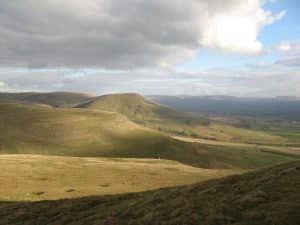Support us from £3/month
We deal with almost 1000 cases a year assisting communities, groups and individuals in protecting their local spaces and paths in all parts of England and Wales. Can you help us by joining as a member?
Local and national organisations (1) are campaigning to stop the Ministry of Defence from destroying a vast area of Cumbria’s cultural history. The MoD wants to deregister three large upland commons (2) and turn them into private land. Objectors say the deregistration would be unlawful and flies in the face of undertakings made by the MoD, at a public inquiry, to keep the commons registered in perpetuity (3).

Photo Roman Fell from Murton Fell, common land threatened with deregistration.
MoD will privatise around 1% (4,500 hectares) of England’s total common land (4) if Cumbria County Council grants it permission (5). This would be the largest enclosure since the major enclosures of commons in the eighteenth and early nineteenth centuries.
If the land is deregistered, it will bring to an end hundreds of years of tradition of upland commoning, and the farming community, which used to have vital grazing rights over this land, would be denied any opportunity in future to graze their stock there.
The land would also lose protection against encroachment and development since works on common land require the consent of the Secretary of State for Environment, Food and Rural Affairs in addition to any planning permission.
William Patterson of the Hilton Commoners’ Association said: ‘When the MOD negotiated the buy-out and extinguishment of the commoners’ grazing rights (known as ‘stints’) on Hilton Fell, Murton Fell and Warcop Fell, one of the fundamental issues was MoD’s agreement to leave the fells on the commons register. On the strength of this undertaking, the commoners accepted the buy-out. It is a breach of trust that the MoD now wants to cancel that undertaking without making a further agreement. I believe that to safeguard the future of these fells the land must remain on the commons register.’
Julia Aglionby of Foundation for Common Land commented: ‘Common land is the most valuable and protected type of land in England, an immensely precious resource for society that has already been reduced to a mere 3% of England’s area. The MoD’s arguments for deregistering 11,000 acres of commons at Warcop are spurious, legally contestable and not in the national interest.’
Viv Lewis of The Federation of Cumbria Commoners said: ‘The Federation is very much opposed to the MoD’s proposal to de-register Hilton, Murton and Warcop commons. Common land is important to hill farmers and makes up some of our most treasured landscapes. If the hills stop being common land and the commoners lose their rights to graze and the sheep leave the hills, what’s to become of the uplands?’
Jan Darrall, of Friends of the Lake District added: ‘The three commons of Warcop, Hilton and Murton amount to 3% of Cumbria’s common land. There is no foundation for the MoD to deregister our commons and destroy our cultural heritage and to deny local use. They gave undertakings during the 2001 Inquiry that the land would remain as common land and are now reneging on this so as to have total control over the land for who knows what? We need to fight for our rich common land to remain for all to enjoy.’
Our case officer, Hugh Craddock, commented: ‘For too long, the MoD has wasted taxpayers’ money ruminating on theoretical risks to the future of the Warcop training estate which have no substance in reality. Now the MoD is wasting more money, and other people’s time, on pursuing an application for deregistration of the Warcop, Hilton and Murton commons which is not only unnecessary and misguided, but entirely contrary to undertakings it previously gave. We shall fight the MoD in its pointless campaign which has dragged on for too long. We hope that the MoD sees sense and withdraws its application, and focuses its resources on managing the Warcop commons in accordance with the commitments it gave in 2002.’
1 The organisations are: Hilton Commoners’ Association, Cumbria Federation of Commons, the Foundation for Common Land, the Friends of the Lake District, and the Open Spaces Society.
2 Common land is land subject to rights of common, to graze animals or collect wood for instance, or waste land of the manor not subject to rights. The public has the right to walk on nearly all commons, and to ride on many. Any works on common land require the consent of the Secretary of State for Environment, Food and Rural Affairs, under section 38 of the Commons Act 2006, in addition to any planning permission.
The three registered Commons are Hilton, Murton and Warcop. The applications to Cumbria County Council are listed as CA14/3 -CL26 Murton; CA14/4 -CL27 Hilton Fell; & -CL122 Burton Fell and Warcop Fell.
3 A public inquiry, held in Appleby in 2001, led to all grazing rights on the commons being bought out by the MoD. In return the MoD created some additional access opportunities on Murton Common and undertook not to deregister the Commons. It also undertook to create new common rights to ensure that the commons would exist in perpetuity. These limited rights were never delivered by the MoD.
4 Cumbria contains around 31% of the registered common land in England which is mostly in the uplands—the Lake District, Yorkshire Dales, and North Pennines. The area covered by commons in Cumbria is 112,786 ha and these three commons cover some 4,500 ha.
5 Cumbria County Council is the commons registration authority for the county and has received three applications from the MoD to deregister the commons of Murton, Hilton and Warcop. The Council will determine the applications but the objectors believe that if it approves them, it would not be in accordance with the Commons Act 2006.
